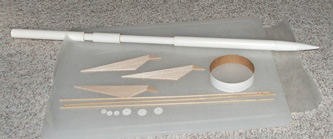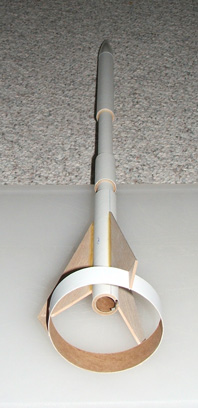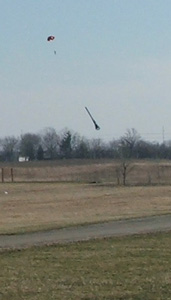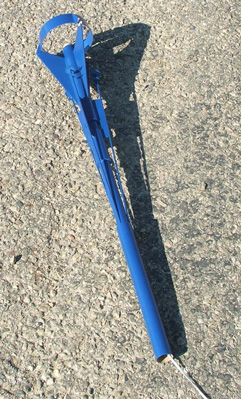| Construction Rating: | starstarstarstarstar |
| Flight Rating: | starstarstarstarstar_border |
| Overall Rating: | starstarstarstarstar_border |
| Manufacturer: | PD Rocketry |
 Brief:
Brief:
The SS Cassiopeia is a straight up clone of the original Estes kit that was available briefly in the 1981-82 model
years. This was the first kit I have ordered from PD Rocketry. I was shocked at how close the whole process was to what
I remember about building Estes kits in the late 70's. I'm kind of torn on this kit because of the lack of an up to
date recovery system, something that I think a kit in this price range should include, but the rush of being
transported in time back to 1981 upon opening the kit is pretty cool.
Construction:
- PNC-50Y nose cone
- 18" BT-20 main BT
- 7.75" BT-50H lower BT
- 2.75" BT-50J middle BT
- 9.5" BT-50W upper BT
- SBT-394AJ stabilizer ring
- LL-2B launch lug
- 12" Mylar® parachute
- DC-1369 die cut card
- 3/32" fin stock
- decal
- 5 AR-2050 adapter rings
- AR-2050S split adapter ring
- 3 WD-1 wood dowels
- EH-2 engine hook
 With the exception of a dowel that was shattered for a third of
its length on arrival, (luckily I had extras,) the kit arrived in good shape. The SS Cassiopeia came with a photocopied
set of the original Estes instructions which are as detailed and uniformly excellent as we've all come to expect.
Overall, construction wasn't as nerve-wracking as looking at the pics led me to believe it would be. I began with
cutting out and assembling the two-piece fins then allowing them to dry between two sheets of waxed paper and two heavy
books. While these parts were drying, I began to assemble the engine mount which was a simple motor hook in the BT-20
main body tube. I scrounged an engine block and engine hook hold-down ring from my parts stash, then began assembling
the 2050 centering rings and three BT-50 sections that form the rest of the main body.
With the exception of a dowel that was shattered for a third of
its length on arrival, (luckily I had extras,) the kit arrived in good shape. The SS Cassiopeia came with a photocopied
set of the original Estes instructions which are as detailed and uniformly excellent as we've all come to expect.
Overall, construction wasn't as nerve-wracking as looking at the pics led me to believe it would be. I began with
cutting out and assembling the two-piece fins then allowing them to dry between two sheets of waxed paper and two heavy
books. While these parts were drying, I began to assemble the engine mount which was a simple motor hook in the BT-20
main body tube. I scrounged an engine block and engine hook hold-down ring from my parts stash, then began assembling
the 2050 centering rings and three BT-50 sections that form the rest of the main body.
 With the body in order, I began attaching the fins. The three main fins needed
to be sanded slightly to allow the ring fin to fit correctly, but this is likely because my tolerances were off when I
was cutting the fins from the supplied balsa sheet. Only a slight sanding of each fin was necessary and the ring slid
easily into place. It was tacked with LocTite®
Gel CA and filleted with Elmers wood glue, as were the fins.
With the body in order, I began attaching the fins. The three main fins needed
to be sanded slightly to allow the ring fin to fit correctly, but this is likely because my tolerances were off when I
was cutting the fins from the supplied balsa sheet. Only a slight sanding of each fin was necessary and the ring slid
easily into place. It was tacked with LocTite®
Gel CA and filleted with Elmers wood glue, as were the fins.
Finishing:
Finishing a complex kit like this is never going to be easy, but there are ways to lessen the pain. Since much of the
main body tube is covered anyway, I marked off the covered sections and concentrated my tube spiral elimination tactics
(thinned Elmer's Fill & Finish,) on the two sections that would show. Subsequent sections were filled and sanded
before they were glued in place and with the exception of the main fins, all other finish work was done before
attachment. Priming was done with Valspar primer and the initial paint was a dark blue mystery paint that I had sitting
around from my stock car modeling days. (I think it was the blue from a Mark Martin Valvoline car.)
Construction Rating: 5 out of 5
Flight:
To date, I've only managed one flight with the Cassiopeia due to some landing damage incurred during that flight.
That said, it was a very impressive flight, marred only by the unfortunate meeting with my mortal enemy the VOA access
road. (Considering that this was the same day that my Empire Bomarc started the field on fire, I considered the
Cassiopeia landing par for the course.)
 The breezes were only sporadic on this particular day, so I chose
to go with a C6-5 for the first flight of the Cassiopeia. There seemed to be little chance of overflying the field and
with the 12" parachute I figured that the chances of it recovering outside of the park were equally slim. The
flight was as I figured, arrow straight and impressively high. Ejection occurred just as it tipped over and the rocket
began to drop on a path that would have taken it out into one of the recently mowed fields across the access road from
the soccer field. I got lulled into a false sense of security and was trying to get a recovery picture when the breeze
died. True to form, the Cassiopeia went from being twenty feet off the ground and riding the light breeze to a safe and
soft recovery to being dropped straight onto the access road. The impact shattered two of the three balsa fin
extensions that held the ring fin in place. In addition, several of the paper dots from the die-cut card that held the
fin extensions to the fins themselves were ripped off and had blown away by the time I arrived to pick up the pieces.
(Not a major loss, but an irritating one.) Everything glued back into place when I got home, but the whole area of the
ring fin will never look as good as it did when the day started, and despite a liberal slathering of wood glue, I have
my doubts as to its strength. I also have my doubts as to future flights.
The breezes were only sporadic on this particular day, so I chose
to go with a C6-5 for the first flight of the Cassiopeia. There seemed to be little chance of overflying the field and
with the 12" parachute I figured that the chances of it recovering outside of the park were equally slim. The
flight was as I figured, arrow straight and impressively high. Ejection occurred just as it tipped over and the rocket
began to drop on a path that would have taken it out into one of the recently mowed fields across the access road from
the soccer field. I got lulled into a false sense of security and was trying to get a recovery picture when the breeze
died. True to form, the Cassiopeia went from being twenty feet off the ground and riding the light breeze to a safe and
soft recovery to being dropped straight onto the access road. The impact shattered two of the three balsa fin
extensions that held the ring fin in place. In addition, several of the paper dots from the die-cut card that held the
fin extensions to the fins themselves were ripped off and had blown away by the time I arrived to pick up the pieces.
(Not a major loss, but an irritating one.) Everything glued back into place when I got home, but the whole area of the
ring fin will never look as good as it did when the day started, and despite a liberal slathering of wood glue, I have
my doubts as to its strength. I also have my doubts as to future flights.
 Recovery:
Recovery:
I knew as soon as I opened this kit that the first thing to go would be the bulk of the recovery system. The tried
and true Estes tri-fold mount had its day, and to be honest is still viable with a kit such as the SS Cassiopeia, but
with Kevlar®
as cheap and plentiful as it is, I saw no reason not to use it. Whatever the case, the shock cord that was supplied
with the kit was so short that it was laughable. I replaced the stock cord with a 36" length of Kevlar®
and a 24" length of 1/8" sewing elastic. This worked well, but nothing helps when you land on asphalt.
Flight Rating: 4 out of 5
Summary:
PRO: It's like stepping back to 1981 to open and build your own SS Cassiopeia! How cool is that?! Updated with a
Mylar®
chute.
CON: It IS like stepping back to 1981 with the recovery system. No Kevlar®. Way too short shock cord. An Estes-style tri-fold mount. This was fine in 1981, but things have improved too much in the 25 years since then to just ignore them. The PD Rocketry web site says that they're making changes, and the recovery system would be next on the list if I had anything to say about it.
Overall Rating: 4 out of 5
Sponsored Ads
-
Quest HL-20 Lifting Body
(OOP) - eBay Auction -
Current Bid: $11.50 (Bids: 2) -
Estes Mini A Heli - eBay Auction -
Current Bid: $5.00 (Bids: 3) -
Vintage US Rockets Mega Roc Instructions And
Decal - eBay Auction -
Current Bid: $0.99 (Bids: 0) -
Estes Cobra (OOP) - eBay Auction -
Current Bid: $20.50 (Bids: 6)
 |
 |



